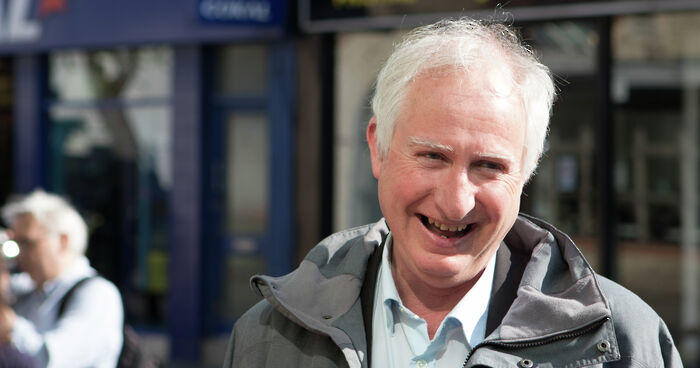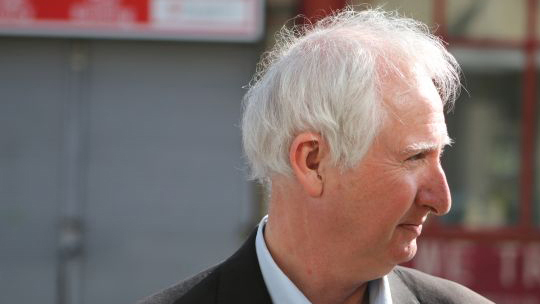
Stuart Tuckwood: ‘I think there is a problem with perception with the Green Party’
The Green Party candidate chats to Patrick Wernham about proportional representation, Trident, and why the Greens should be taken more seriously

Stuart Tuckwood is everything you’d imagine the Green Party’s candidate for Cambridge to be. I mean that in the best possible way – he’s friendly and engaging, seeming to be genuinely interested in how my revision is going (okay, maybe not). The country might not be heading the way a Green Party candidate would like, but Tuckwood refuses to be pessimistic at any point in our interview.
We’ve come to expect that from the Greens, though. They’re the ones with left-field ideas, putting forward bold ideas for radical change. They might be mocked by the mainstream press, but their core support, mostly drawn from young people, remains fiercely loyal. The only problem is, that sounds an awful lot like the Labour Party in 2017. What, then, can the Green Party offer that Labour under Jeremy Corbyn can’t?
“There’s a still a number of big ideological differences between ourselves and the Labour Party,” replies Tuckwood, quickly. “The fact that they’re still not committed to proportional representation is a huge issue because I’m sure at this election, lots of Green voters are weighing up whether they should vote Labour or vote Green. Unless Labour fully commit to introducing PR then they’ll still be held hostage in years to come, there still won’t be the ability for people to vote for what they actually believe in.”
“I don’t necessarily think that it’s a bad thing that Labour have taken on lots of Green Party policies”
Stuart Tuckwood
But Tuckwood isn’t all that upset about sharing common ground with Labour: “I don’t necessarily think that it’s a bad thing that Labour have taken on lots of Green Party policies. I’ve never been highly party political or highly partisan, I think it’s great that the Labour Party have backed us in wanting to abolish tuition fees, wanting votes for 16 and 17 year olds, and wanting free school meals for children.”
There are a few Green policies that haven’t yet made it onto the Labour manifesto, though. They pledge to introduce a universal basic income, free universal early years education up to the age of seven, and look at moving towards a four day working week. All perfectly laudable, but don’t ideas like that make the Greens seem a bit, well, bonkers?
Tuckwood laughs: “dropping one day from the working week is not a particularly radical idea! British workers basically already work the longest hours, with the fewest breaks, the fewest holidays, of workers in western Europe and other western economies.”
“So actually looking to make sure British workers can be more productive, and there’s lots of evidence that when people have more time off, they’re better rested, they are more productive in work, so it wouldn’t actually entail taking an economic hit.”
There might be sound reasoning behind it, but that’s not the point. Don’t people hear things like a four day working week and think the Greens are living on another planet?
“I think there is a problem with perception with the Green Party. It’s difficult for us to get our message out to people directly, because everything goes through the media, and sometimes the media like to play up this kind of ‘wacky Green policy’ idea.”

But Tuckwood isn’t downbeat about it. “The more we get media exposure, the more we actually speak to people when we’re campaigning, the more they see that these are sensible ideas and so we just need to try and break through that and make sure people hear our arguments.”
Okay, the policies might not be that mad then. But they are rather expensive. I ask Tuckwood where on earth the Greens are going to get the money to pay for those promises.
“Well, to start with, you can look at the priorities when you get to government. Renewing Trident and HS2, two very big, costly, vanity projects that could cost anywhere up to £200 billion between them?”
Hold up – Trident a vanity project? With an increasingly bellicose North Korea and a US that we might want to stand increasingly independent of?
“I think the argument you’ve made about North Korea, and other rogue states we’ve been having to deal with, almost undermines the argument for Trident, because Trident isn’t a reliable defence from attacks from these kind of countries.”
Mentioning the recent cyber-attack on the NHS, Tuckwood continues. “The threats that we’re facing are changing very much and investing tens of billions of pounds in this sort of unreliable nuclear deterrent isn’t actually the most reliable way of defending ourselves.”
Changing scale entirely, I ask Tuckwood what he considers the biggest issue facing Cambridge. His answer, somewhat predictably though no less reasonably, is Brexit. “Cambridge has benefitted so massively from freedom of movement, through funding for higher education and through our membership of the single market, all of which are at threat because of Brexit. They’re not necessarily all going to disappear, but we just don’t know at the moment.”
“It’s definitely a huge issue, and we need a representative who goes to Westminster to fight for protecting higher education, trying to make sure we’ve still got free movement of people so it benefits our public services, our businesses and our society.”
The problem facing Tuckwood, much like Daniel Zeichner and Julian Huppert, is that any one of them could have given that answer. Though they would argue otherwise, for a left-leaning Cambridge student, it can sometimes seem difficult to prise apart the three candidates. Why should they vote Green?
“All other parties have shown themselves incapable of solving the problems facing young people. They’ve all contributed towards lots of debt, an inability to find a house, and most importantly, not being able to tackle the threat of climate change.”
“Only the Green representatives are serious about taking the bold action over the next five years that we need to solve these issues, and only by voting differently will we be able to achieve those things.”
With a Labour Party more-left wing than it has been for thirty-odd years, and the Liberal Democrats selling themselves as the anti-Brexit party, Tuckwood faces a challenge in standing out. While it remains to be seen how well he’ll do, it’s hard to escape the feeling that the race is a better one with him in it
Meet the candidates
 Features / Should I stay or should I go? Cambridge students and alumni reflect on how their memories stay with them15 December 2025
Features / Should I stay or should I go? Cambridge students and alumni reflect on how their memories stay with them15 December 2025 News / Cambridge study finds students learn better with notes than AI13 December 2025
News / Cambridge study finds students learn better with notes than AI13 December 2025 News / Dons warn PM about Vet School closure16 December 2025
News / Dons warn PM about Vet School closure16 December 2025 Comment / The magic of an eight-week term15 December 2025
Comment / The magic of an eight-week term15 December 2025 News / News In Brief: Michaelmas marriages, monogamous mammals, and messaging manipulation15 December 2025
News / News In Brief: Michaelmas marriages, monogamous mammals, and messaging manipulation15 December 2025












